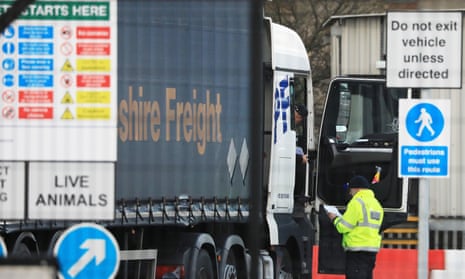The UK foreign secretary has reiterated her threat to scrap parts of the Northern Ireland Brexit protocol, telling the EU’s Brexit negotiator it was a matter of “internal peace and security”.
Liz Truss warned Maroš Šefčovič in a phone call that unless the EU showed the “requisite flexibility” in talks over the trading arrangements she would have “no choice but to act”.
It was the first time the pair had spoken since it was revealed the UK was considering tabling draft legislation to override part of the special Brexit trading arrangements for Northern Ireland.
The standoff between the two is testing wider relations with the EU at a time when “bigger things” such as Finland joining Nato are happening, Ireland’s foreign minister, Simon Coveney, said on Thursday.
David McAllister, a German centre-right MEP who chairs the European parliament’s UK coordination group, said the EU was united against renegotiating the protocol.
“The protocol was signed and ratified by both sides. Nobody here in Brussels is interested in starting these new complicated discussions and political fights,” he said.
Truss said she had told Šefčovič the protocol was “the greatest obstacle” to forming a new Northern Ireland executive following last week’s elections.
Šefčovič told her there was “no room to expand the negotiating mandate or introduce new proposals to reduce the overall level of trade friction”, according to a Foreign Office statement.
“The foreign secretary noted this with regret and said the situation in Northern Ireland is a matter of internal peace and security for the United Kingdom, and if the EU would not show the requisite flexibility to help solve those issues, then as a responsible government we would have no choice but to act,” it added.
In a statement after the call, Sefčovič said it remained of “serious concern that the UK government intends to embark on the path of unilateral action”.
Referring to a set of ideas to cut customs checks issued last October, he said the EU had proposed “a series of wide-ranking and impactful solutions” that would “substantially improve” the way the protocol was implemented.
He also said the EU was still waiting for the UK’s response to proposals it made in February. “We have made clear that there is still potential to be explored in our proposals,” he said.
“Unilateral action, effectively disapplying an international agreement such as the protocol, is simply not acceptable,” he said, warning it would undermine trust and compromise “our ultimate objective”, the protection of the Good Friday agreement.
Coveney has said the threats to introduce legislation to unilaterally disapply parts of the Brexit agreement were counterproductive as such a move would be met with legal action.
But he also told RTÉ it was right that the UK wanted to ensure there were no checks on goods that remain in Northern Ireland, suggesting there was a landing zone if the UK withdrew its threats.
The attorney general for England and Wales, Suella Braverman, was said to have approved the scrapping of large parts of the Northern Ireland Brexit deal, according to reports.
The move came as a leading US congressman, Brendan Boyle, described the government’s plans to move away from a treaty it signed two years ago as a “very frustrating” and “counterproductive” pattern that was causing concern in Washington.
The Washington ad hoc committee to protect the Good Friday agreement described the UK’s plans as “neither strategic or wise” and said it would not have the support of Joe Biden.
We look forward to meeting @ConorBurnsUK this Friday. Tearing up the Protocol, which is boosting the NI economy, & starting a trade war with the larger EU in order to protect the GFA is neither strategic or wise & won’t sell @POTUS. Fully implementing GFA much more promising
— Ad Hoc Committee to Protect GFA (@HocGfa) May 11, 2022
Braverman has advised that legislation to override the Northern Ireland protocol would be legal because the EU’s implementation of it was “disproportionate and unreasonable”, the Times has reported.
In evidence to her findings, Braverman said the EU was undermining the Good Friday agreement by creating a trade barrier in the Irish Sea and fuelling civil unrest, the newspaper said.
The threats by the UK government to introduce a law to disapply parts of the protocol which, if implemented in full, would mean physical and customs checks on food and some other goods, were already causing a rift within the Tory party and with EU leaders.
Senior MPs warned there were a number of ministers prepared to resign if faced with passing the bill into law. Sources close to Truss have stressed that no final decision had been made and that any potential legislation was intended to run in parallel with further talks.
Boyle said the UK should listen to the majority of people in Northern Ireland who, he said, did not vote for the protocol to be abandoned.
“Ever since almost the moment that Boris Johnson and David Frost negotiated the Northern Ireland protocol and signed it, it seems as if every other month or so, they’re threatening to rip it up and unilaterally walk away, so it is a very frustrating cycle that we’ve had to deal with over the last several years, completely counterproductive, and not in accordance with the expressed wishes of the majority of Northern Ireland.
“Literally two days ago, the people of Northern Ireland elected pro-protocol parties and candidates by a margin of 60% to 40%, right? So I think we should actually listen to the overwhelming majority of people in Northern Ireland,” he said.
